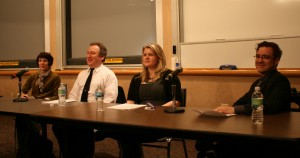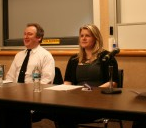Using Facebook can result in significant mental health consequences, according to William Kinney, St. Thomas sociology professor.

Kinney cited a study Tuesday night at an academic symposium that showed heavy Facebook users have low self-esteem and report high levels of loneliness.
“The American Academy of Pediatrics put out a warning just this month about a new phenomenon they are calling ‘Facebook Depression,’” Kinney said. “They are warning parents to limit their children’s use of Facebook and other forms of communication because [they] tend to create feelings of inadequacy and inferiority.”
The Aquinas Scholars Honors Program hosted the symposium, titled “Social Networking: Taking a Look at the Social Networking Phenomenon from the Perspectives of Communications, Law, Marketing and Sociology.” The four symposium panelists included Carol Bruess, communication and journalism professor; C. Scott Rader, marketing professor; William Kinney, sociology professor; and Sarah Gillaspey, St. Thomas law student.
Privacy concerns and health risks associated with social media were key points discussed by panelists and students at the symposium.
Matthew Vogel, a philosophy, Catholic studies and classical languages triple major, said the symposium was insightful.
“I especially liked the interdisciplinary aspect of it, and how there were lots of different perspectives,” Vogel said. “I also liked the subject because it is relevant to what we are dealing with right now.”
Freshman Luke Darger, a music business major, said he connected with some of Rader’s comments about businesses adjusting to social media.
“I think [Rader] brought up an interesting point about how social media is going to be used to market to customers in the future,” Darger said. “It really reaffirms that people value the real interactions online, the conversations and the feedback. They don’t want glam shots, they don’t want record company stuff, they want real interactions.”
Kinney discussed some of the negative consequences of Facebook and how it has changed social interactions.
“Some people argue that Facebook is the modern equivalent of religious cults in the 1970s,” Kinney said. “We are reaching out to become more connected and have the social ties we need in our life but are unable to find.”
Professor Bruess talked about how these social ties can be strong ties or weak ties. Strong ties are our connections with those closest to us, our family and friends, she said, while our weak ties include our connections with the person we sit next to on the bus or the person behind us in line at a restaurant. She said communication research shows social media and other technology play a role in forming these ties.
“Our strong ties tend to be getting stronger, and we are more connected with our families and our core group of friends,” Bruess said. “But we are weakening our weak ties, and by weakening these ties we are eroding much of our sense of community.”
Despite some of the negative discussions of Facebook during the symposium, Vogel said his social media practices probably won’t change.
“It hasn’t really changed my views, but it was good to get more knowledge about it,” Vogel said. “I think it widened my perspective.”
Gillaspy discussed social media problems that lawyers face, such as confidentiality, misrepresentation and jurisdictional dilemmas. She gave one example of how a jurisdictional dispute might arise through social media use.
“If I pass the Minnesota bar exam, I will have a license to practice law in Minnesota, but I can’t practice anywhere else,” Gillaspey said. “But if I’m online and someone from Oregon asks a legal question and I answer it, am I practicing outside my jurisdiction?”
During the Q-and-A session, the discussion focused on Facebook privacy and how college students should handle their private information.
Rader said the convenience of Internet sites such as Google or Facebook comes at a cost.
“I think it is important to realize that Facebook is not free,” Rader said. “The cost of using Facebook is that you’re being data-mined, and you have to disclose a lot of private information you are putting out there.”
Darger said the symposium opened his eyes to the consequences of Facebook.
“It makes me want to use [social media] a bit less,” Darger said.
Gillaspey said the current generation needs to take a more active role in its interactions with social media.
“Once we start taking ownership and control over the way social media interacts with our lives, then it will become far more useful and far more convenient,” Gillaspey said. “We will be able to design it in ways that are more specific to our lives.”
Dan Cook can be reached at cook9156@stthomas.edu.

